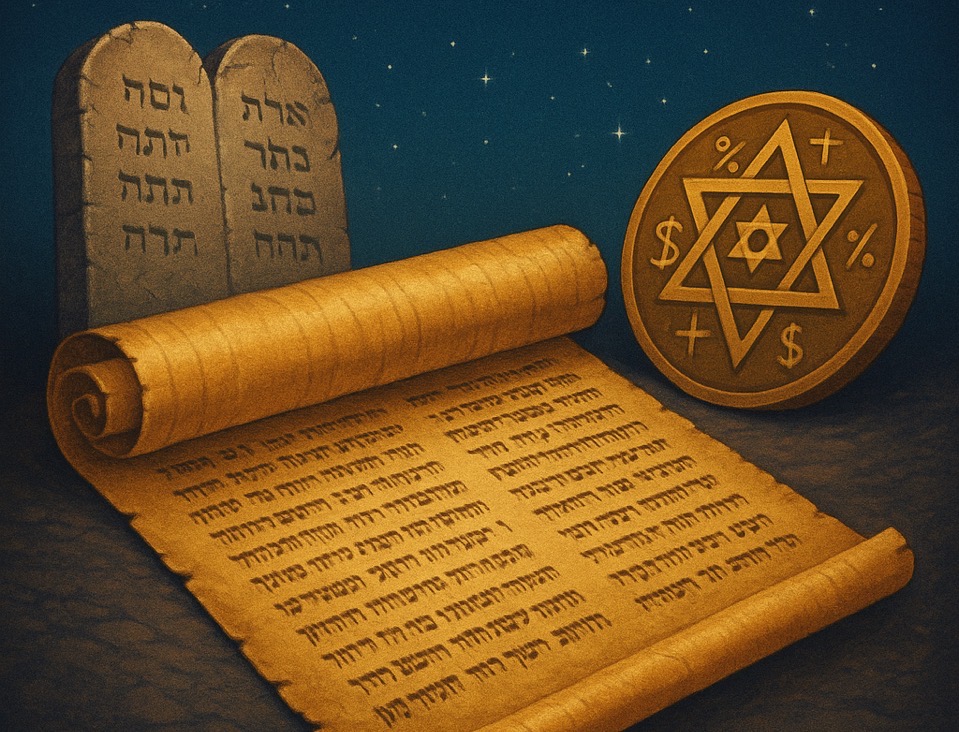在纷繁复杂的人类历史长河中,犹太民族以其独特的生存方式和文化延续成为一个特例。细究其背后,一神论不仅是宗教信仰的宣言,更是一套高度系统化的民族生存策略。从表面看,这是一段关于信仰的故事;从深层看,这更像是犹太人祖先为子孙后代设计的一套精巧的生存方案——一种让后代可以“以智取胜,规避劳力密集型生存模式(即勤劳致富)”、在地球上优雅生存的深谋远虑。
地球上没有哪个民族像犹太人那样叙述从开天辟地及后来人们的谋生之道,简言之就是:到应许之地牧羊、献祭、做贸易、繁衍后代……。一神论的提出,打破了当时世界普遍存在的多神崇拜格局。犹太人不再接受众神割据、信仰分裂的局面,而是通过构建独一神的体系,将民族的存在神圣化,把自身历史置于宇宙中心。他们不是普通民族,而是神的选民;他们的生活、法律、文化,都源自天命。这种神圣叙事,将普通的民族生存问题提升为超越性的宗教使命,并借此为自己在世俗世界中的特殊地位提供了终极正当性。

回望历史,真正关于犹太民族起源、迁徙、征战的独立考古证据少之又少。无论是出埃及的壮丽叙事,还是征服迦南的胜利故事,除了圣经文本,几乎没有其他独立文献或实物考古给予印证。就连Flavius Josephus(弗拉维奥·约瑟夫斯)的两部重要著作,为深入了解犹太历史所写的《犹太古史》(The Antiquities of the Jews)也几乎完全来自于妥拉,即摩西五经,根本不能称其为严格意义上的历史书。换言之,犹太人的历史几乎完全由自己撰写,而这部由《妥拉》主导的历史,将一切成败、兴衰,都镶嵌进了神圣的秩序中。
在这套体系下,犹太人并不需要传统意义上的国家机器或军事扩张来维护自己的存在。他们用律法、用信仰、用家庭教育、用人口繁衍,维系着群体的认同感。他们不必依赖土地,而是把生存重心转向知识、金融、贸易等高智力、高文化含量的领域。信仰成为文化资本,文化资本成为社会生存的工具。犹太人的后代因此得以在不同文明、不同时代中立足,甚至优雅地占据社会上层。
如果从地理和环境的角度看,中东地区本身土地贫瘠、资源有限,生存压力极大,容易催生出对绝对秩序与唯一权威的信仰需求。一神论正是在这种资源稀缺、竞争激烈的环境中应运而生,是对于自然不可控性的一种心理与社会组织回应。值得注意的是,伊斯兰教同样诞生于中东,继承了大量犹太教和基督教的观念,也提出了严格的一神论体系,但其路径显得更为直接粗粹,缺乏犹太人那种深厚的文化积淀与隐忍式生存智慧,反倒像是虽试图模仿,但缺乏深厚的文化沉淀,过于露骨地将宗教直接与扩张、权力、法律合而为一,但其与现代社会的动态适应性不足,也越来越加速了非伊斯兰教的主流文明与其疏离。
犹太人以宗教维护文化,以文化维护身份,以身份稳固经济与社会地位,伊斯兰世界则更多诉诸武力扩张与制度压制。这种策略上的微妙差异,决定了两种文明走向的分野。
从这个角度来看,犹太人的一神论与其说是来自天启的真理,不如说是犹太人祖先深谙人类社会规律后的一次精密设计。他们以神的名义,为自己编织了一套可持续的生存体系。犹太人所谓的“神”,并不一定是超越人的存在,而是犹太人智慧的象征和策略的化身,从这方面讲,与伊斯兰教的安拉有那么一点相似。
通过神的叙事,犹太民族赋予了自己独一无二的合法性,免于劳动密集的生存方式,通过金融与文化积累财富,以教育与律法传承身份,靠着一代代的生育和传承,持续在文明体系中保持独立与优越。他们不必争斗,不必依赖暴力,不必劳作土地,却能在社会顶端优雅生存。
可以说,犹太民族用一神论,为自己子子孙孙在这个星球上铺设了一条无需争战、无需屈从、持续繁荣的道路。那位唯一的神,既是他们的信仰之神,也是他们的生存之神。
结语:
圣经作为人类精神生活的重要文本,揭示了神对人生活的指引,但不应成为政治的外衣,每个人的人生都有神独一无二的指引与自由,都有权活出精彩的人生,不应成为任何宗教形式的奴隶。
Monotheism: The Meticulous Survival Strategy of the Jewish Nation
In the vast and intricate course of human history, the Jewish people have distinguished themselves by their unique mode of survival and cultural continuity. Upon closer examination, monotheism is not merely a declaration of religious faith but a highly systematized survival strategy for the nation. On the surface, it tells a story of belief; at a deeper level, it appears to be a meticulously crafted plan by the Jewish ancestors — a strategy enabling their descendants to “triumph with wisdom and avoid labor-intensive survival patterns (i.e., to gain wealth not through toil),” ensuring an elegant existence on this planet.
No other nation on earth has narrated its history from the creation of the world to the practicalities of livelihood as thoroughly as the Jewish people — migration to the Promised Land, herding, sacrifice, trade, and reproduction. The proposal of monotheism shattered the prevalent polytheistic order of the ancient world. The Jews rejected the division of gods and fragmented beliefs and instead built a system centered on a singular deity, sanctifying their national existence and positioning their history at the center of the cosmos. They were not an ordinary people but the chosen ones of God; their way of life, laws, and culture were rooted in divine will. This sacred narrative elevated the ordinary struggles of national survival into a transcendent religious mission, thereby securing their unique status in the secular world.

Looking back at history, there is little independent archaeological evidence regarding the origins, migrations, and conquests of the Jewish people. The grand Exodus narrative and the conquest of Canaan, for instance, are attested almost exclusively by the biblical texts, with few independent corroborating documents or archaeological finds. Even Flavius Josephus’s two significant works, including The Antiquities of the Jews, which aimed to offer a historical account of the Jewish people, draw heavily from the Torah — the Pentateuch — and cannot be considered historical records in the strictest sense. In other words, the history of the Jewish people is almost entirely self-written, with the Torah embedding all their triumphs and declines into a sacred cosmic order.
Within this system, the Jews did not rely on traditional state apparatuses or military expansion to maintain their existence. They utilized law, faith, family education, and reproduction to preserve a strong sense of collective identity. Rather than depending on land, they shifted their survival focus toward knowledge, finance, trade, and other high-intellect, high-culture sectors. Faith became cultural capital, and cultural capital became a tool for survival. Consequently, the Jewish descendants were able to establish themselves across different civilizations and eras, even occupying upper echelons of society with remarkable grace.
From a geographical and environmental perspective, the Middle East is inherently barren and resource-scarce, creating immense survival pressure. Such conditions tend to foster a demand for absolute order and singular authority. Monotheism emerged precisely in response to this scarcity and competition — a psychological and social organizational answer to the uncontrollable forces of nature. Notably, Islam also arose in the Middle East, inheriting much from Judaism and Christianity and promoting a strict monotheistic doctrine. However, Islam’s path appeared more direct and unrefined, lacking the profound cultural accumulation and enduring survival wisdom of Judaism. Though attempting to emulate, it lacked the deep cultural foundation and too overtly merged religion with expansion, power, and law. Its rigidity and detachment from the dynamics of modern society have increasingly hastened the estrangement between Islamic societies and mainstream global civilization.
The Jews preserved their culture through religion, safeguarded their identity through culture, and secured their economic and social status through identity. In contrast, the Islamic world has leaned more on military expansion and institutional suppression. This subtle strategic difference has determined the divergent trajectories of the two civilizations.
From this perspective, Jewish monotheism is less a revelation from the divine and more a meticulously crafted design, born from their ancestors’ profound understanding of human social structures. In the name of God, they wove a sustainable survival system. Their so-called “God” may not necessarily be a being beyond humanity but rather a symbol of Jewish wisdom and strategy — in this sense, bearing a certain resemblance to Allah in Islam.
Through the narrative of God, the Jewish people granted themselves a unique legitimacy, evading labor-intensive modes of survival, accumulating wealth through finance and culture, and passing down their identity through education and law. Generation after generation, through reproduction and the transmission of cultural capital, they have maintained independence and superiority within the global civilization. They did not need to engage in conflict, rely on violence, or till the soil, yet they managed to survive gracefully at the top of societal hierarchies.
It can be said that the Jewish people, through monotheism, paved a path for their descendants — a road to continuous prosperity without war or subjugation. Their one and only God is not only the God of their faith but also the God of their survival.
Conclusion
The Bible, as a cornerstone of human spiritual life, reveals divine guidance for human living, but it should not become a garment for political ambitions. Every individual has the right to a unique divine guidance and freedom and to live a brilliant life, not as a slave to any religious form.
请填写邮箱,免费获取新文章。

发表回复